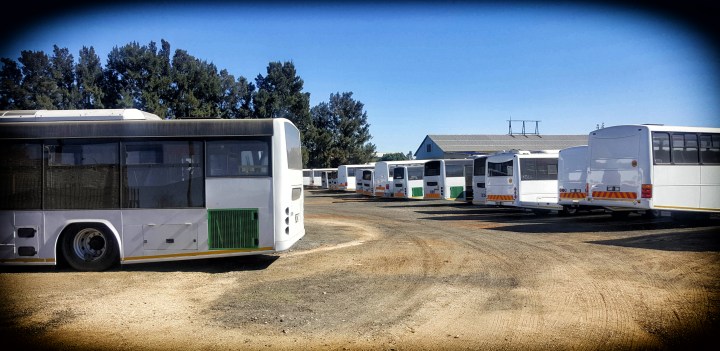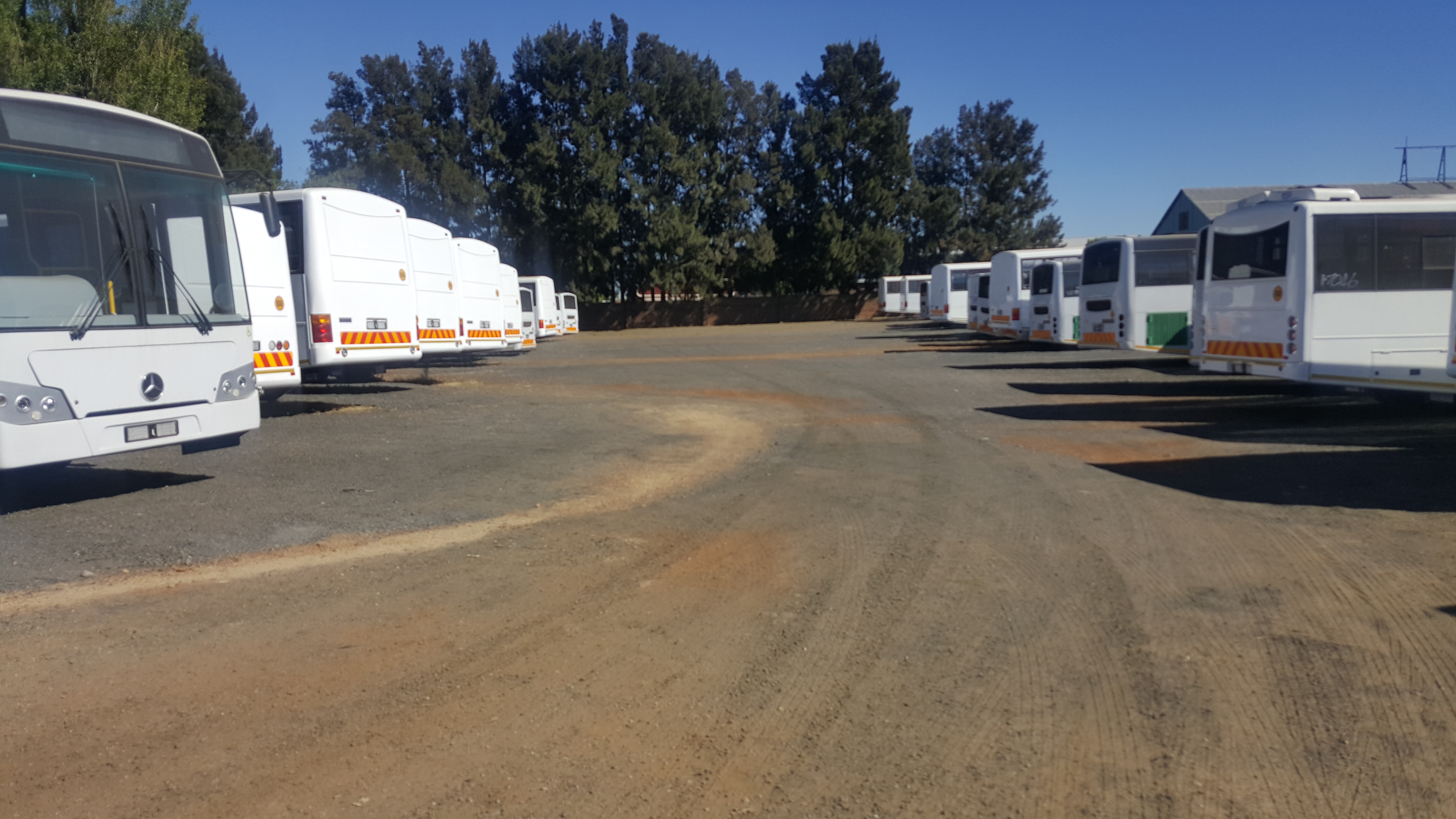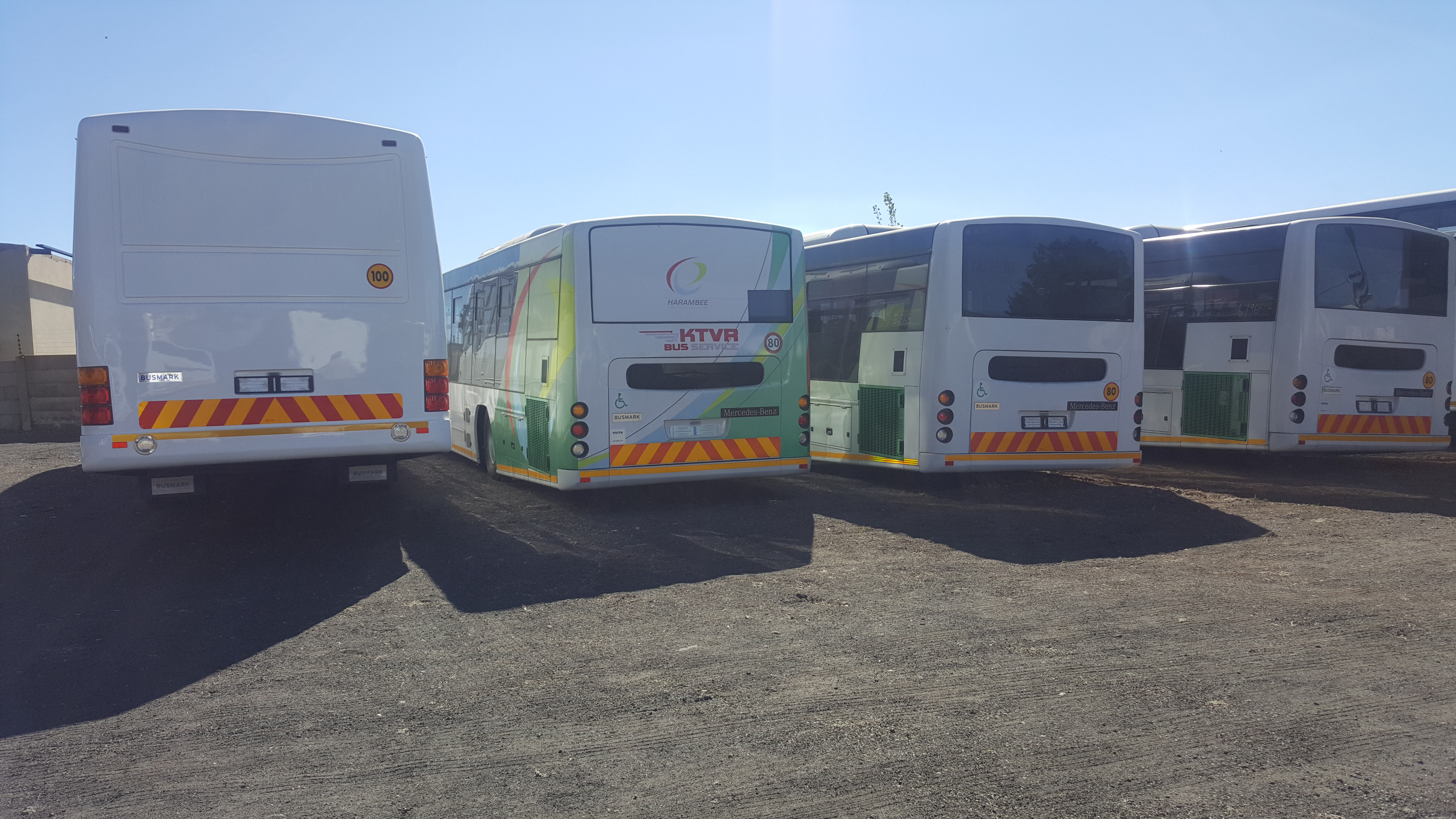AMABHUNGANE
Billions blown but buses remain bogged down

After seven years of development and a fortune spent, the Ekurhuleni BRT system is in disarray. The municipality is only now scrambling to find out what went wrong.
The City of Ekurhuleni council has resolved to institute a full forensic investigation on its bus rapid transit (BRT) project, but sources who know its history claim it is too little, too late.
“I am not sure what this investigation will achieve as the damage has been done. This project has been bled dry and used as a cash cow by certain politicians, taxi industry bosses and City officials,” said one source, who has intimate knowledge of the project, but has requested anonymity because of fear for his safety.
The resolution to institute a forensic probe was taken on 25 July at a mayoral committee meeting.
“The city of Ekurhuleni can confirm that certain challenges have been identified inasfar as some areas of this project are concerned,” City spokesman Themba Gadebe said in a statement.
Gadebe added that the City’s expectation is that the forensic investigation will highlight areas of concern, identify implicated individuals and recommend remedial action.
But the problems with BRT systems are deep-seated and structural, as the Ekurhuleni experience shows.

Wrong turns
BRT systems implemented around the country form part of the Integrated Public Transport Network (IPTN) launched on the back of preparations for the 2010 soccer World Cup, with generous set-up funding via special transfers from national Treasury.
They were intended to provide an efficient, reliable and affordable public transport system, which would “displace and replace”, or at least co-opt and corporatise a minibus taxi industry characterised by conflict and under-regulation.
In truth, they were part of a top-down and grandiose policy paradigm that was one real legacy of 2010 – and almost everywhere in South Africa they have not gone as planned.
The choices of what model to follow have been heavy on big infrastructure (purpose-built bus lanes and stations with their associated juicy construction contracts). The perverse incentives for the taxi industry have been underestimated or ignored – as has the patronage, infighting and instability promoted by the “resource curse” of a large pot of once-off cash from Treasury.
And taxi formations have predictably outmanoeuvred (or simply out-gunned) even well-meaning municipal efforts.
Ekurhuleni has been no exception.
The Ekurhuleni BRT system, known as Harambee, aims to connect the nine towns that make up the metro: Benoni, Germiston, Springs, Kempton Park, Edenvale, Nigel, Brakpan, Boksburg and Alberton.
But the alleged hijacking of Harambee for private political and commercial advantage, as well as rampant financial mismanagement, have derailed the ambitious plans of having a world-class facility.
A parliamentary report following an oversight visit in September 2017 states that the BRT system, under construction since the 2011/12 financial year, had by then already run up R2.2-billion in costs.

Allegations
While the municipality is yet to appoint a forensic company to probe the details, several of amaBhungane’s sources claimed that these factors were at the root of the bungle:
-
Managers of a special purpose vehicle called the KTVR Bus Company effectively hijacked the project. (KTVR represents taxi associations affected by the project: Kempton Park, Tembisa, Vosloorus and Reiger Park.)
-
Municipal incompetence and senior officials kowtowed to KTVR demands in an effort to “keep the peace”.
-
Local political barons manipulated the project behind scenes for political leverage and to benefit from contracts.
Meanwhile, for some residents who live near BRT stations in Tembisa township, the system has not brought much benefit other than frustrating traffic congestion.
“The construction has taken years and the only people that benefited is the construction companies; even those who were temporarily employed. To be honest we don’t care any more; Our lives haven’t changed,” said one Tembisa resident who lives near the station and did not want to be named.
The buses are running on a trial basis but so irregularly that it hardly makes sense for people to use them.
The delay has also affected the company contracted to manufacture 210 hi-tech buses to be used for the BRT system. According to the company, Busmark, 186 completed buses have been standing idle at the factory for the past two years, not yet paid for and gathering dust.
One of the project’s main aims was to create jobs for bus drivers, security personnel, cleaners and others, but this is also on hold.
The municipality did not answer amaBhungane’s detailed questions but issued a statement announcing the probe.
“The Mayoral Committee, after being exposed to a report regarding the status of the project … resolved that the City Manager urgently institute a full forensic investigation to get to the bottom of this matter,” the statement said.
The City declined to disclose the report on which it said the decision was based.

Counterallegations
Buti Mahlangu, acting as spokesman for both the Ekurhuleni Taxi Industry and KTVR, of which he is a director, laid the blame squarely on the municipality’s shoulders.
While the City builds the infrastructure, the BRT model requires it to negotiate with the taxi industry to set up a company – in this case KTVR – to own and run the bus system. The taxi industry is supposed to give up taxi routes along the BRT corridors.
Mahlangu provided a long list of what he said were the City’s shortcomings, including:
-
The “continued unending BRT construction which affects our operations and hence our livelihood”.
-
The failure to appoint a technical adviser for the taxi industry in order to “negotiate a fair deal”. This was after a previous contract for an advisor came to an end in 2017.
-
The failure to appoint a service provider to determine the value of the business that affected operators were giving up, and therefore the level of their compensation through the new bus company.
Mahlangu claimed the actions of mayor Mzwandile Masina and city manager Dr Imogen Mashazi were calculated to destabilise the BRT negotiations.
He accused the mayor of “bringing ANC politics to the Harambee BRT, hence destabilising the City and [the taxi industry’s] engagements”.
One complaint revolves around suspending the head of the municipal transport department in the middle of BRT negotiations.
Lusanda Madikizela was suspended in early March pending an investigation into spiralling costs for the construction of two taxi ranks. She, in turn, reportedly accused the City manager of using “baseless allegations” to force her to resign.
Shortly afterwards the Ekuhuleni taxi industry launched a one-day strike protesting against the implementation of the BRT and calling for the mayor and City manager to be removed from their positions with immediate effect.
Power struggle?
Other sources close to the project point to a political struggle between mayor Masina – who famously swore he would not serve under a Ramaphosa presidency – and his rival Petrus Mabunda, who heads the transport portfolio in the mayoral committee.
Our sources claimed the strike was orchestrated by Mabunda to rattle his political opponent with the aid of KTVR chairman Kenneth Mtshali, and that the game plan was to use the proceeds of BRT contracts to fund Mabunda’s political aspirations.
“This is all about politics and lining of pockets as this is a multibillion-rand project. Mtshali and Mabunda are very close and their end game was to take over the project by making sure they place puppets they can control,” said one of the sources, who is anxious about his safety.
He claimed Mabunda cozied up to the taxi industry because he wanted to advance his ambition of toppling Masina.
Mabunda denied this, as did Mahlangu on behalf of Mtshali.
“The allegation of me orchestrating the strike for my political ambition is incorrect and demeaning to suggest political contestation in the ANC needs money,” Mabunda said.
Mabunda rubbished claims of a personal connection, saying: “Myself and Mr Mtshali have a professional relationship.”
Mahlangu said he had no knowledge of Mabunda interfering or involving himself in internal taxi industry issues.
Mahlangu said that one of the reasons for the tensions between the industry and the municipality was the City’s “failure to support the [taxi industry] in obtaining finance for the BRT buses from the DBSA [Development Bank of Southern Africa]”.
The taxi industry had negotiated a R846-million loan from DBSA to purchase the buses but the deal, according to the bank, has not been finalised and no payment has been made.
The City has apparently refused to provide the necessary approvals, according to City municipal sources.
A bountiful Harvest
Another bone of contention is the appointment of Harvest Chartered Accountants, chosen in 2015 as technical advisers to assist the Ekurhuleni taxi industry with the restructuring process.
Sources claimed that the taxi barons had rejected all other bidders for the contract and insisted they wanted Harvest.
A transport department insider said:
“In the middle of the BEC [bid evaluation committee] meeting, [the KTVR’s] Mtshali and[Mahlangu] with other guys walked into the meeting and insisted on staying. When Mabunda was called to intervene he told the officials that the taxi industry has the right to sit in while the tender was being evaluated.
“Since that day Mtshali has been sitting in at internal meetings on anything that has to do with BRT… The officials are intimidated and scared to raise any concerns. They have [effectively] taken over the department.”
But Mahlangu claimed there was nothing untoward about their presence.
“It is not true that we barged into the process. I was invited by City officials to observe their process which is not in any way illegal… Mtshali was not part of the process at all.”
Mahlangu denied interfering in municipal internal procedures but said the technical adviser had to meet the approval of the industry.
The technical advisory tender was advertised and five companies were short-listed but according to a municipal memo dated 27 January 2015, there were no suitable companies that met the criteria.
Mabunda said: “The [supply chain management] department falls within the finance department which is not my political responsibility.”
A document seen by amaBhungane suggests the Harvest appointment was eventually done via a deviation that permitted the nomination of a single source bidder.
The motivation for the deviation, dated 30 March 2015, stated:
“The nature of the taxi industry and the public transport sector is that there is a need for a level of trust based on previous relationships with service providers. This aspect is extremely important as it may ‘make or break’ the negotiations.”
The memo stated that the taxi industry had written to the municipal manager two months earlier to indicate that the industry was “suspicious of government appointing advisers that do not have their trust and hence they have been victims of many consultants who have ill advised them with dire consequences of divisions and violence in the industry.”
The Harvest contract was for R25-million over two years, ending 30 June 2017. The contract was extended for six more months for R3-million.
Harvest managing director Martin Mudau said there was nothing untoward about their appointment.
“Harvest was appointed by the City to provide technical advisory services to the Ekurhuleni taxi industry in 2015 through a tender process run by the city.”

Structural problems
Part of the problem is the structure and timing of the project.
The municipality is nowhere near finalising the hard work of identifying taxi operators genuinely affected by the project, quantifying their interest and hammering out an agreement for them to get together and run a bus company.
But without that in place, the City wanted to procure buses and begin to offer services on its expensively built infrastructure. Hence the KTVR is an “interim structure” which is supposed to hold the assets and business “in trust” for an operating company still to be formed.
The KTVR board and management consists of taxi bosses elected from the affected local taxi bodies; it is “independent” but entirely funded by transfers from the municipality and must seek approvals for key decisions.
KTVR is expected to arrange funding, buy buses and run the interim service – while negotiating with the municipality to run the full BRT system once operational.
In theory, taxi operators stand to benefit from the project in that not only will they be shareholders in the vehicle operating company, but they would be compensated for the loss of their old business.
Who benefits?
However, critics have claimed that the company was mainly benefiting people connected to the KTVR board.
A senior municipal source said the City had already paid R94-million to KTVR.
“Officials in the transport department have been asking for audited statements to see how the money has been spent but they have yet to see any. Instead KTVR submit invoices and demand payment,” said the source.
According to a KTVR interim service plan, which amaBhungane has seen, it cost the municipality R15-million just to set up the KTVR office and it paid a further R40-million from May to August 2016.
The same document said a three-year budget from 2016-2019 was projected to be about R996-million.

However, KTVR spokesman Mahlangu said he was not at liberty to disclose amounts.
“The … agreement requires of KTVR to provide audited statements annually which happened last year [2017] and the next one is due within six months. The audited statements are not for public disclosure.”
He added that if Ekurhuleni had any issue they had the right to terminate the contract.
Another area of concern for critics was the registration of businesses by KTVR directors, mainly Mtshali and Mahlangu.
“These millions are circulating within a selected few. These companies are being lined up to be contractors once BRT is in place. Who do you think it is going to supply stationery, uniforms, fuel etc… so who is benefiting here?” asked the source.
AmaBhungane established that Mtshali has become a director to four companies since he became chairman of KTVR and Mahlangu two companies, one being an approved repair centre.
Mahlangu however defended him and Mtshali.
“We do not have such companies doing business with KTVR currently; however we are not restricted to do so.”
Mahlangu said the BRT project was designed to empower taxi operators, drivers and all other employees affected by the removal of the taxis from routes, which in turn would affect their work.
Idle buses
Another example of the destructive battle between the taxi industry and the City relates to the buying of buses which were to be used in the BRT.
While KTVR is independent, it is bound by agreements with the City including one that stipulates the “procurement process for the buses must be conducted in a manner that is fair, equitable, transparent, competitive and cost effective”.
However, Mahlangu told amaBhungane that KTVR, as a private company, “can appoint any bus company of its choice”.
He added that the taxi industry had agreed with the City to appoint a company called Busmark as the bus manufacturer since the City had already embarked on a process to appoint them to supply some buses for the interim service.
“Eight have been loaned to KTVR to operate the interim service while negotiations carry on,” he said.
The R846-million DBSA loan was meant to pay for the full fleet, which has apparently already been ordered.
Busmark chief executive Pat Nodada said the Ekurhuleni BRT delays were undermining his business and he felt aggrieved that he was sitting with 186 buses and a valid contract but no payment.
“This is affecting my business, I delivered on my contractual obligations but now everyone is keeping quiet because they are not affected. I want answers,” he said.
Nodada said each bus will cost between R2-million and R2.9-million and that he understood the loan was not all going towards his buses. The buses, he said, were going to cost about about R600-million.
He said his understanding was that the physical infrastructure was not complete.
Rethinking BRT
The delay in Ekurhuleni comes as government appears to be raising questions as to whether the BRT system was worth the billions spent on it.
In 2017 the then national minister of transport, Joe Maswanganyi, acknowledged that there were “challenges with BRT systems”.
Maswanganyi was quoted as telling the South African Transport Conference that commuters were shunning the system in favour of taxis and conventional buses and it was necessary to “rethink and redesign” BRT systems so that they could stop “draining money from the fiscus”.
He was echoed by Gauteng transport MEC Ismail Vadi‚ who was quoted telling the conference that the three BRT systems in Gauteng – in Tshwane, Johannesburg and Ekurhuleni – were built at a collective cost of around R10-billion but were transporting only about 75,000 people a day.
“Ridership is not great,” Vadi said.
He said it was necessary to question whether government was “getting value for money” in building BRT systems; whether it was necessary to build “big, expensive, median bus stations”, and whether it was necessary to make use of expensive, big-brand buses.
“Is this the way to go? Is this cost-effective?”
In Ekhurhuleni, at least, the answer seems clear. DM
Provided by:

We are an independent, non-profit investigative journalism centre. Like this story? Be an amaB supporter. Sign up for our newsletter. Visit us at amaBhungane.co.za.

















 Become an Insider
Become an Insider